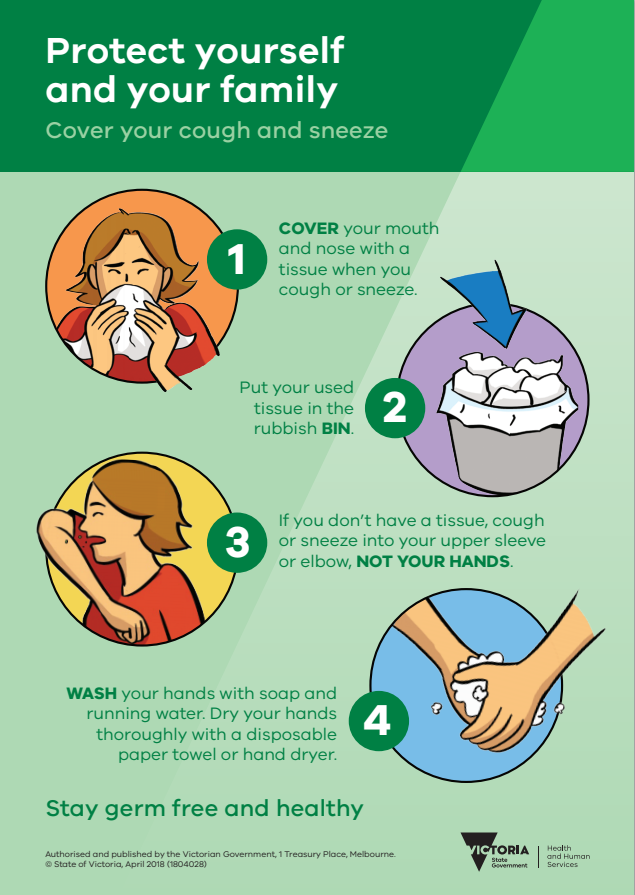



Information on coronavirus (COVID-19)
Victoria’s health system is prepared for an emerging coronavirus (COVID-19) pandemic with a new plan to manage more cases and the growing risk of an outbreak in Victoria.
The COVID-19 Pandemic Plan for the Victorian Health Sector sets out a four-stage response to COVID-19. The plan is flexible and proportionate to the current risk and will be updated as we learn more about the virus.
Central Gippsland Health (CGH) is working closely with the Department of Health and Human Services (DHHS) as well as regional health services across the region.
Importantly, we ask that you call first before coming into our Emergency Department if you meet the suspected case definition for COVID-19.
You can also call the coronavirus hotline on 1800 675 398
It is also important for people to practise good hygiene such as washing your hands regularly and staying at home if you are feeling unwell. Please take time to read the information below.
What is coronavirus?
Coronaviruses are a large family of viruses that cause illness in animals or humans. These coronaviruses include the common cold and more severe diseases like the Severe Acute Respiratory Syndrome (SARS-CoV). COVID-19 is a new form of coronavirus, which causes respiratory symptoms, similar to the flu.
Most people who have been diagnosed with COVID-19 have only experienced a mild illness and recovered, however the illness can be more severe for others, including vulnerable populations such as the elderly.
The risk of contracting COVID-19 can be reduced through proper hand hygiene, respiratory etiquette and social distancing.
What are the symptoms of COVID-19?
Those with symptoms of COVID-19 are most likely to have a fever (above 38 degrees Celsius) and may have respiratory symptoms like a sore throat, cough or shortness of breath. Of those who are admitted to hospital, some do develop serious illness.
How does COVID-19 spread?
COVID-19 is spread from droplets of infected fluid. These are passed on when someone who is infected with the virus coughs or sneezes within close contact or if surfaces which are contaminated with the virus are touched.
How do I reduce my risk of contracting COVID-19?
Hand hygiene and respiratory etiquette are two terms that you may have heard of when you have heard about how to reduce your risk of COVID-19. This refers to washing your hands properly and often, and using proper sneezing and coughing practices (covering your nose and mouth with a tissue or coughing or sneezing into your upper sleeve and elbow).
Here are 10 ways you can reduce your risk of getting COVID-19:
- Wash hands often with soap and running water, for at least 20 seconds. Dry with paper towel or hand dryer.
- Try not to touch your eyes, nose or mouth.
- Cover your nose and mouth with a tissue when you cough or sneeze. If you don’t have a tissue cough or sneeze into your upper sleeve or elbow.
- Isolate yourself at home if you feel sick. If you take medication ensure you have adequate supplies.
- Phone your GP first if you need medical attention. They will tell you what to do.
- Continue healthy habits: exercise, drink water, get plenty of sleep, and now is the time to quit smoking. Call the Quitline 137 848.
- Don’t wear a face mask if you are well.
- Buy an alcohol-based hand sanitiser with over 60 per cent alcohol.
- Get the flu shot (available April).
- Shaking hands is optional
Important information for the general public
- For the latest information on #Coronavirus disease in Victoria, visit the Department of Health and Human Services website: https://www.dhhs.vic.gov.au/coronavirus #COVID19
- If you are concerned about #Coronavirus disease in Victoria, call the Department of Health and Human Services Coronavirus hotline on 1800 675 398. Please keep Triple Zero (000) for emergencies only. For up-to-date info: https://www.dhhs.vic.gov.au/coronavirus #COVID19.
- The #coronavirus situation changes rapidly. For the latest information see @VicGovDHHS https://www.dhhs.vic.gov.au/coronavirus #COVID19
- #Coronavirus disease can spread after close contact with an infectious person, through droplets from a cough or sneeze, and touching of contaminated services. This is most likely to occur after travel to an affected country, or through living in a house with a person with the infection. Learn more: https://www.dhhs.vic.gov.au/coronavirus #COVID19
- Victorians should now take steps to prepare for the possibility of transmission of coronavirus disease in Victoria in the coming weeks or months. For the latest advice follow @VicGovDHHS and visit https://www.dhhs.vic.gov.au/coronavirus #COVID19
- Protect yourself from #Coronavirus by washing your hands regularly with soap and water; and try not to touch your face, including your eyes, nose or mouth. One way to become infected is to transfer the virus from a contaminated surface to your face or mouth by touching. More from @VicGovDHHS https://www.dhhs.vic.gov.au/coronavirus #COVID19
– Find out more about the #coronavirus disease in Victoria: https://www.dhhs.vic.gov.au/coronavirus #COVID19.
- Personal hygiene is an important protection against #coronavirus disease and all respiratory illnesses – this includes washing hands regularly, especially after using the toilet and before eating. Get the latest information for Victorians: https://www.dhhs.vic.gov.au/coronavirus #COVID19.
- Consider slowly stocking up on essential items, just in case you need to self-isolate due to #coronavirus . Find out what you need to do from the Department of Health & Human Services: https://www.dhhs.vic.gov.au/coronavirus #COVID19
- If you have recently been to mainland China or Iran, or had contact with a confirmed case of #coronavirus disease – find out what you need to do from @VicGovDHHS https://www.dhhs.vic.gov.au/coronavirus #COVID19.
